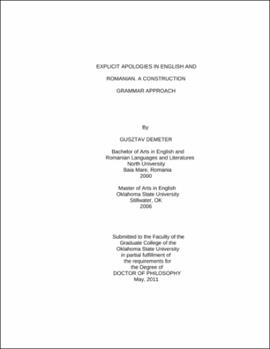| dc.contributor.advisor | Moder, Carol Lynn | |
| dc.contributor.author | Demeter, Gusztav | |
| dc.date.accessioned | 2013-11-26T08:29:31Z | |
| dc.date.available | 2013-11-26T08:29:31Z | |
| dc.date.issued | 2011-05 | |
| dc.identifier.uri | https://hdl.handle.net/11244/7060 | |
| dc.description.abstract | Scope and Method of Study: The aim of the present study is to investigate the construal of explicit apologies in American English and Romanian from a Construction Grammar perspective. A discourse analysis methodology using spoken and written corpora was used to establish the constructions expressing apologies in the two languages. | |
| dc.description.abstract | Findings and Conclusions: Findings show that a Construction Grammar approach and the analysis of apologies in natural contexts of use at the discourse level allow for distinguishing uses of apologies that have not been previously reported by studies using elicited data. These uses include co-constructed apologies, repair apologies, interruption apologies, and fictive apologies, which were used in both English and Romanian. We have also found that other categories of apologies reported in prior studies, such as acknowledging responsibility, providing an explanation, and denying responsibility form a responsibility continuum, with the choice of construction used to apologize contributing to the position of the apology on the continuum. Apologies were also found to occur in written discourse in contexts that evoke interaction. We categorized these contexts into written, fictive, and quoted interaction. Finally, different constructions were used in spoken and written discourse in both languages. | |
| dc.description.abstract | Although the functional categories used to analyze apologies in English were found to be useful to categorize the ones in Romanian, as well, the specific constructions used to express apologies were specific to Romanian. This confirms claims and previous findings that constructions are language specific. While English used different lexical items in constructions to distinguish levels of formality, Romanian used different morphological forms of the same lexical item. This is possible due to the highly inflectional nature of Romanian. | |
| dc.description.abstract | The results of the study indicate that discourse analysis using corpora is an effective way of analyzing apologies in real language, creating a picture of this speech act that can be different than the one reported by studies using elicited data. | |
| dc.format | application/pdf | |
| dc.language | en_US | |
| dc.rights | Copyright is held by the author who has granted the Oklahoma State University Library the non-exclusive right to share this material in its institutional repository. Contact Digital Library Services at lib-dls@okstate.edu or 405-744-9161 for the permission policy on the use, reproduction or distribution of this material. | |
| dc.title | Explicit apologies in English and Romanian. A construction grammar approach | |
| dc.contributor.committeeMember | Damron, Rebecca L. | |
| dc.contributor.committeeMember | Halleck, Gene B. | |
| dc.contributor.committeeMember | Kennison, Shelia M. | |
| osu.filename | Demeter_okstate_0664D_11334.pdf | |
| osu.accesstype | Open Access | |
| dc.type.genre | Dissertation | |
| dc.type.material | Text | |
| thesis.degree.discipline | English | |
| thesis.degree.grantor | Oklahoma State University | |
